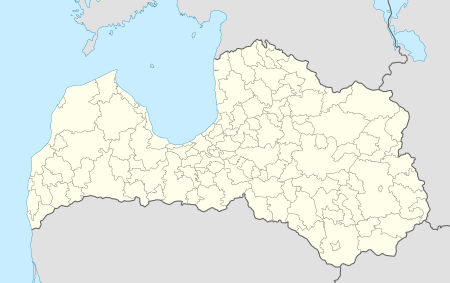Valka
| Valka | |||
|---|---|---|---|
| Town | |||
 Lugaži Lutheran Church in Valka. | |||
| |||
| Motto(s): 1 pilsēta, 2 valstis (1 city, 2 countries) | |||
 Valka Location in Latvia | |||
| Coordinates: 57°46′N 26°0′E / 57.767°N 26.000°ECoordinates: 57°46′N 26°0′E / 57.767°N 26.000°E | |||
| Country |
| ||
| Municipality | Valka Municipality | ||
| Town rights | 1584 | ||
| Government | |||
| • Mayor | Vents Armands Krauklis | ||
| Area | |||
| • Town | 14.36 km2 (5.54 sq mi) | ||
| Elevation | 50 m (160 ft) | ||
| Population | |||
| • Town | 5,835 | ||
| • Density | 381/km2 (990/sq mi) | ||
| • Metro | in Valga-Valka 19,500 | ||
| • Metro density | 630/km2 (1,600/sq mi) | ||
| Time zone | UTC+2 (EET) | ||
| • Summer (DST) | UTC+3 (EEST) | ||
| Postal code | LV-470(1-2) | ||
| Calling code | +371 647 | ||
| Number of municipality council members | 15 | ||
Valka (![]()
Valka and the Estonian town Valga are twins, separated by the Estonian/Latvian border but using the slogan "One Town, Two Countries". The border dividing the Livonian town of Walk was marked out in 1920 by an international jury headed by British Colonel Stephen George Tallents. With the expansion of the Schengen Agreement and abolition of the Estonian/Latvian border in 2007, it was announced that common public bus transport would be established between Valka and Valga.[1] Also, all border crossing-points were removed and roads and fences opened. In 2016 it was announced that due to better welfare and higher salaries in Estonia, many Valka inhabitants have registered themselves as inhabitants of Valga.[2]
History
The town of Walk (in German) was first mentioned in 1286 and from 1419 was the seat of the Landtag of the Livonian Confederation. City rights were granted by the Polish king Stefan Batory in 1584. However, the town gained its importance only at the end of the 19th century when the Vidzeme teacher's seminary was operating here, and the important railway junction was developed. Furthermore, the first narrow-gauge railway line in the territory of modern Latvia was stretched from Valka to Estonian city of Pärnu.
On 15 November 1917 the decision to proclaim the independent Republic of Latvia was made in Valka. The red-white-red flag of Latvia was raised here for the first time. On 1 July 1920 the town was divided between the newly-born Latvian and Estonian states.
Education
There is one primary school and a gymnasium in Valka. The Institute of Latvia-Estonia provides further education.
Notable people
- Jānis Cimze (1814–1881), pedagogue, founder of Vidzeme teacher's seminary - first higher education institution in Latvia's territory
- Aigars Fadejevs (born 1975), Olympic race-walker, winner of silver medal at Olympic Games of 2000 in Sydney
- Vents Armands Krauklis (born 1964), musician, politician, former mayor of Valka city (2001–2006), member of Saeima (2006-2010), current mayor of Valka municipality
- Roberts Ķīlis (born 1968), social anthropologist, former Minister of Education and Science (2011-2013)
- Pavel Loskutov (born 1969), Estonian long-distance runner
- Gatis Smukulis (born 1987), road bicycle racer
- Andris Vilks (born 1963), former Minister of Finance (2009-2014)
Sister cities
Valka is twinned with seven cities:[3]
Gallery
- Semināra iela
- Rīgas iela (Riga Street) at the Estonian border.
- Apartment building from the Soviet era.
- Pedele River in Valka.
- Valka Primary school
See also
References
- ↑ "Establishment of common public bus transport" (PDF).
- ↑ Desmitā daļa Valkas novada iedzīvotāju reģistrējušies Igaunijā, vēsta raidījums
- ↑ "International cooperation". Valka. Retrieved 4 May 2014.
- ↑ "Radviliskis". Radviliskis. Archived from the original on 8 April 2014. Retrieved 3 May 2014.
External links
| Wikimedia Commons has media related to Valka. |
| Wikivoyage has a travel guide for Valka. |
- Official website (in English)

